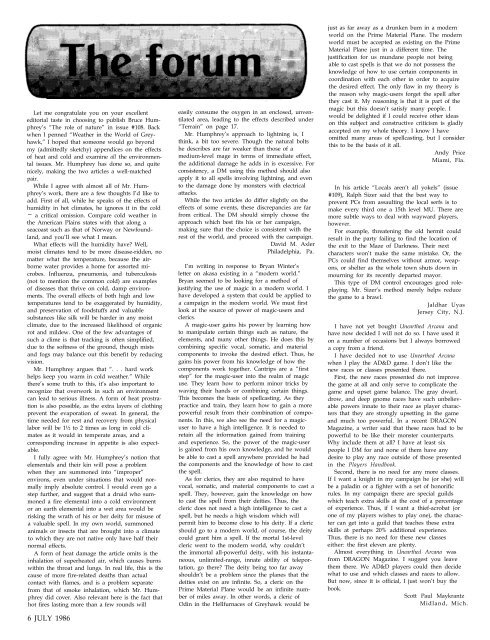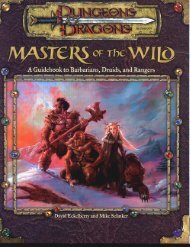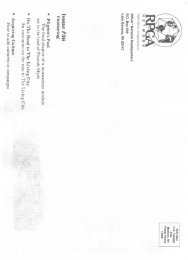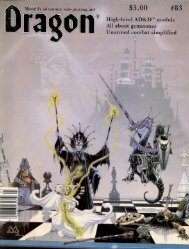Accessory - Dragon Magazine #111.pdf - Index of
Accessory - Dragon Magazine #111.pdf - Index of
Accessory - Dragon Magazine #111.pdf - Index of
You also want an ePaper? Increase the reach of your titles
YUMPU automatically turns print PDFs into web optimized ePapers that Google loves.
Let me congratulate you on your excellent<br />
editorial taste in choosing to publish Bruce Hum-<br />
phrey’s “The role <strong>of</strong> nature” in issue #108. Back<br />
when I penned “Weather in the World <strong>of</strong> Greyhawk,”<br />
I hoped that someone would go beyond<br />
my (admittedly sketchy) appendices on the effects<br />
<strong>of</strong> heat and cold and examine all the environmental<br />
issues. Mr. Humphrey has done so, and quite<br />
nicely, making the two articles a well-matched<br />
pair.<br />
While I agree with almost all <strong>of</strong> Mr. Humphrey’s<br />
work, there are a few thoughts I’d like to<br />
add. First <strong>of</strong> all, while he speaks <strong>of</strong> the effects <strong>of</strong><br />
humidity in hot climates, he ignores it in the cold<br />
— a critical omission. Compare cold weather in<br />
the American Plains states with that along a<br />
seacoast such as that <strong>of</strong> Norway or Newfoundland,<br />
and you’ll see what I mean.<br />
What effects will the humidity have? Well,<br />
moist climates tend to be more disease-ridden, no<br />
matter what the temperature, because the airborne<br />
water provides a home for assorted microbes.<br />
Influenza, pneumonia, and tuberculosis<br />
(not to mention the common cold) are examples<br />
<strong>of</strong> diseases that thrive on cold, damp environments.<br />
The overall effects <strong>of</strong> both high and low<br />
temperatures tend to be exaggerated by humidity,<br />
and preservation <strong>of</strong> foodstuffs and valuable<br />
substances like silk will be harder in any moist<br />
climate, due to the increased likelihood <strong>of</strong> organic<br />
rot and mildew. One <strong>of</strong> the few advantages <strong>of</strong><br />
such a clime is that tracking is <strong>of</strong>ten simplified,<br />
due to the s<strong>of</strong>tness <strong>of</strong> the ground, though mists<br />
and fogs may balance out this benefit by reducing<br />
vision.<br />
Mr. Humphrey argues that “. . . hard work<br />
helps keep you warm in cold weather.” While<br />
there’s some truth to this, it’s also important to<br />
recognize that overwork in such an environment<br />
can lead to serious illness. A form <strong>of</strong> heat prostration<br />
is also possible, as the extra layers <strong>of</strong> clothing<br />
prevent the evaporation <strong>of</strong> sweat. In general, the<br />
time needed for rest and recovery from physical<br />
labor will be 1½ to 2 times as long in cold climates<br />
as it would in temperate areas, and a<br />
corresponding increase in appetite is also expectable.<br />
I fully agree with Mr. Humphrey’s notion that<br />
elementals and their kin will pose a problem<br />
when they are summoned into “improper”<br />
environs, even under situations that would normally<br />
imply absolute control. I would even go a<br />
step further, and suggest that a druid who summoned<br />
a fire elemental into a cold environment<br />
or an earth elemental into a wet area would be<br />
risking the wrath <strong>of</strong> his or her deity for misuse <strong>of</strong><br />
a valuable spell. In my own world, summoned<br />
animals or insects that are brought into a climate<br />
to which they are not native only have half their<br />
normal effects.<br />
A form <strong>of</strong> heat damage the article omits is the<br />
inhalation <strong>of</strong> superheated air, which causes burns<br />
within the throat and lungs. In real life, this is the<br />
cause <strong>of</strong> more fire-related deaths than actual<br />
contact with flames, and is a problem separate<br />
from that <strong>of</strong> smoke inhalation, which Mr. Humphrey<br />
did cover. Also relevant here is the fact that<br />
hot fires lasting more than a few rounds will<br />
6 JULY 1986<br />
easily consume the oxygen in an enclosed, unventilated<br />
area, leading to the effects described under<br />
“Terrain” on page 17.<br />
Mr. Humphrey’s approach to lightning is, I<br />
think, a bit too severe. Though the natural bolts<br />
he describes are far weaker than those <strong>of</strong> a<br />
medium-level mage in terms <strong>of</strong> immediate effect,<br />
the additional damage he adds in is excessive. For<br />
consistency, a DM using this method should also<br />
apply it to all spells involving lightning, and even<br />
to the damage done by monsters with electrical<br />
attacks.<br />
While the two articles do differ slightly on the<br />
effects <strong>of</strong> some events, these discrepancies are far<br />
from critical. The DM should simply choose the<br />
approach which best fits his or her campaign,<br />
making sure that the choice is consistent with the<br />
rest <strong>of</strong> the world, and proceed with the campaign.<br />
David M. Axler<br />
Philadelphia, Pa.<br />
I’m writing in response to Bryan Winter’s<br />
letter on akasa existing in a “modern world.”<br />
Bryan seemed to be looking for a method <strong>of</strong><br />
justifying the use <strong>of</strong> magic in a modern world. I<br />
have developed a system that could be applied to<br />
a campaign in the modern world. We must first<br />
look at the source <strong>of</strong> power <strong>of</strong> magic-users and<br />
clerics.<br />
A magic-user gains his power by learning how<br />
to manipulate certain things such as nature, the<br />
elements, and many other things. He does this by<br />
combining specific vocal, somatic, and material<br />
components to invoke the desired effect. Thus, he<br />
gains his power from his knowledge <strong>of</strong> how the<br />
components work together. Cantrips are a “first<br />
step” for the magic-user into the realm <strong>of</strong> magic<br />
use. They learn how to perform minor tricks by<br />
waving their hands or combining certain things.<br />
This becomes the basis <strong>of</strong> spellcasting. As they<br />
practice and train, they learn how to gain a more<br />
powerful result from their combination <strong>of</strong> components.<br />
In this, we also see the need for a magicuser<br />
to have a high intelligence. It is needed to<br />
retain all the information gained from training<br />
and experience. So, the power <strong>of</strong> the magic-user<br />
is gained from his own knowledge, and he would<br />
be able to cast a spell anywhere provided he had<br />
the components and the knowledge <strong>of</strong> how to cast<br />
the spell.<br />
As for clerics, they are also required to have<br />
vocal, somatic, and material components to cast a<br />
spell. They, however, gain the knowledge on how<br />
to cast the spell from their deities. Thus, the<br />
cleric does not need a high intelligence to cast a<br />
spell, but he needs a high wisdom which will<br />
permit him to become close to his deity. If a cleric<br />
should go to a modern world, <strong>of</strong> course, the deity<br />
could grant him a spell. If the mortal 1st-level<br />
cleric went to the modern world, why couldn’t<br />
the immortal all-powerful deity, with his instantaneous,<br />
unlimited-range, innate ability <strong>of</strong> teleportation,<br />
go there? The deity being too far away<br />
shouldn’t be a problem since the planes that the<br />
deities exist on are infinite. So, a cleric on the<br />
Prime Material Plane would be an infinite number<br />
<strong>of</strong> miles away. In other words, a cleric <strong>of</strong><br />
Odin in the Hellfurnaces <strong>of</strong> Greyhawk would be<br />
just as far away as a drunken bum in a modern<br />
world on the Prime Material Plane. The modern<br />
world must be accepted as existing on the Prime<br />
Material Plane just in a different time. The<br />
justification for us mundane people not being<br />
able to cast spells is that we do not posssess the<br />
knowledge <strong>of</strong> how to use certain components in<br />
coordination with each other in order to acquire<br />
the desired effect. The only flaw in my theory is<br />
the reason why magic-users forget the spell after<br />
they cast it. My reasoning is that it is part <strong>of</strong> the<br />
magic but this doesn’t satisfy many people. I<br />
would be delighted if I could receive other ideas<br />
on this subject and constructive criticism is gladly<br />
accepted on my whole theory. I know I have<br />
omitted many areas <strong>of</strong> spellcasting, but I consider<br />
this to be the basis <strong>of</strong> it all.<br />
Andy Price<br />
Miami, Fla.<br />
In his article “Locals aren’t all yokels” (issue<br />
#109), Ralph Sizer said that the best way to<br />
prevent PCs from assaulting the local serfs is to<br />
make every third one a 15th level MU. There are<br />
more subtle ways to deal with wayward players,<br />
however.<br />
For example, threatening the old hermit could<br />
result in the party failing to find the location <strong>of</strong><br />
the exit to the Maze <strong>of</strong> Darkness. Their next<br />
characters won’t make the same mistake. Or, the<br />
PCs could find themselves without armor, weapons,<br />
or shelter as the whole town shuts down in<br />
mourning for its recently departed mayor.<br />
This type <strong>of</strong> DM control encourages good roleplaying.<br />
Mr. Sizer’s method merely helps reduce<br />
the game to a brawl.<br />
Jaldhar Uyas<br />
Jersey City, N.J.<br />
I have not yet bought Unearthed Arcana and<br />
have now decided I will not do so. I have used it<br />
on a number <strong>of</strong> occasions but I always borrowed<br />
a copy from a friend.<br />
I have decided not to use Unearthed Arcana<br />
when I play the AD&D game. I don’t like the<br />
new races or classes presented there.<br />
First, the new races presented do not improve<br />
the game at all and only serve to complicate the<br />
game and upset game balance. The gray dwarf,<br />
drow, and deep gnome races have such unbelievable<br />
powers innate to their race as player characters<br />
that they are strongly upsetting in the game<br />
and much too powerful. In a recent DRAGON<br />
<strong>Magazine</strong>, a writer said that these races had to be<br />
powerful to be like their monster counterparts.<br />
Why include them at all? I have at least six<br />
people I DM for and none <strong>of</strong> them have any<br />
desire to play any race outside <strong>of</strong> those presented<br />
in the Players Handbook.<br />
Second, there is no need for any more classes.<br />
If I want a knight in my campaign he (or she) will<br />
be a paladin or a fighter with a set <strong>of</strong> honorific<br />
rules. In my campaign there are special guilds<br />
which teach extra skills at the cost <strong>of</strong> a percentage<br />
<strong>of</strong> experience. Thus, if I want a thief-acrobat (or<br />
one <strong>of</strong> my players wishes to play one), the character<br />
can get into a guild that teaches these extra<br />
skills at perhaps 20% additional experience.<br />
Thus, there is no need for these new classes<br />
either: the first eleven are plenty.<br />
Almost everything in Unearthed Arcana was<br />
from DRAGON <strong>Magazine</strong>. I suggest you leave<br />
them there. We AD&D players could then decide<br />
what to use and which classes and races to allow.<br />
But now, since it is <strong>of</strong>ficial, I just won’t buy the<br />
book.<br />
Scott Paul Maykrantz<br />
Midland, Mich.







